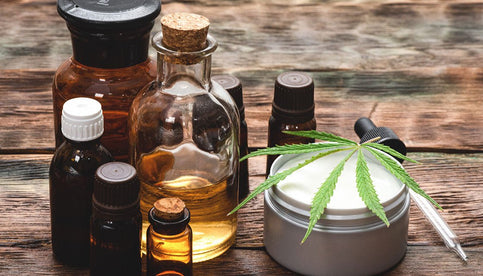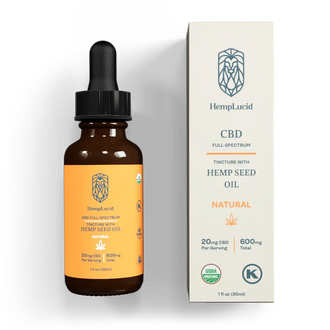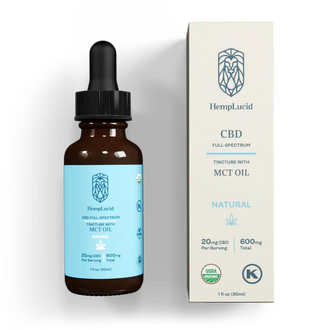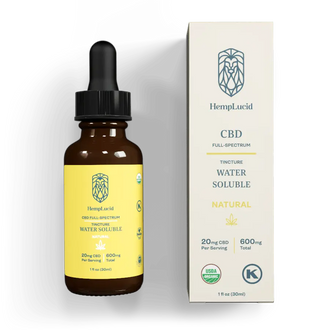
Carrier Oils—Why You Need Them and How They Work
Ever found yourself wondering about the term 'carrier oil' while browsing for skincare or wellness products? Well, you're not alone. Carrier oils, also known as lipid oils, play a crucial role in skincare and medicinal blends, and yet they're often misunderstood.
While it’s easy to think that CBD oil is pure CBD, this is usually not the case. CBD is diluted in a carrier oil to enhance its bioavailability and fuel our endocannabinoid system.
These rich, fatty oils, which include everyday staples like olive, avocado, and coconut oil, are called 'carrier oils' because they 'carry' other ingredients and compounds. Whether you're creating an essential oil blend or a facial cream, it's the carrier oil that holds and delivers the other components safely.
However, the term 'carrier oil' is a bit of a misnomer, and it's important to know why. So let's delve deeper into what we call 'carrier oils', and why they're so much more than just vehicles for other ingredients.
Understanding the Concept of Carrier Oil
Piercing the myth that carrier oils are mere "carriers", it's integral to comprehend their transformative properties first. Derived primarily from nuts and seeds, carrier oils replete with essential fatty acids, nourish cells and eliminate toxins. Notably, these oils produce and maintain the skin's natural oil barrier, create an antimicrobial shield against harsh elements, and reduce water loss through the skin's surface. By enhancing the texture and softness of skin and hair, they indeed contribute to a youthful, supple appearance.
Some carrier oils contain selenium, known for its antioxidant activity. This component aids in slowing the appearance of wrinkles and assists in healing burns, wounds, and other skin conditions. Additionally, carrier oils can include medium-chain triglycerides (MCTs) that eliminate harmful forms such as bacteria, viruses, and fungi while offering intense moisturization.
Among the wide spectrum of carrier oils available, glycerin stands out. Many wonder, "Is glycerin a carrier oil?" Though technically not an oil, glycerin is a colorless, odorless liquid derived from plant oils. Globally recognized for its humectant properties, it's frequently used as a carrier for other ingredients. It attracts moisture to the skin, thus ensuring its hydration and increasing the efficacy of other active ingredients applied to the skin.
The reality is that carrier oils are indispensable components that not only transport active ingredients safely but also add exceptional value to skincare and medicinal preparations. It's time to appreciate these silent players in our skincare regimen for their substantial benefits.
Extraction Methods of Carrier Oils
When it comes to carrier oils and their extraction, experts value cold-pressed, raw, organic, unrefined, and extra virgin oils. Cold pressing ensures carrier oils don't heat over 45 degrees Celsius (110 degrees Fahrenheit), preserving the natural makeup of the oil. Carrier oils remain raw throughout this process, with filtration only eliminating dust and small particles. This ensures a preservation of vital nutrients, vitamins, and fatty acids within the oil.
The epitome of high-quality oils are Extra Virgin Carrier Oils, pressed only once. With a single press, these oils retain a dense nutrient profile, staying unadulterated. For example, glycerin, while not technically oil, is heavily utilized in the carrier oil industry owing to its natural attraction to moisture. However, its extraction technique differs slightly involving saponification or a hydrolysis process.
It's imperative to note that although essential oils never turn rancid, carrier oils do. Factors such as the level of natural fatty acids, tocopherols, and extraction methods can all contribute to the rate at which carrier oils become rancid. A strong, bitter aroma usually indicates rancidity.
While purchasing carrier oils, one can notice some exceptions like if the carrier oil has natural Vitamin E added to it. Listed often as tocopherols, Vitamin E serves as a natural preservative for the oil.
Although Vegetable butters aren't classified as carrier oils, they boast beneficial properties suitable for aromatherapy. Precisely, Cocoa Butter and Shea Butter fall into this lipid category. These butters, despite not being pure oils, exhibit advantageous qualities sought in carrier oils and hence find their place in therapeutic uses.
To sum it up, extraction methods play a pivotal role in determining the quality of carrier oils, maintaining their integrity, nutrient profile, and lifespan. Understanding these nuances can help you make an informed choice about carrier oils, whether it's for skincare, hair care, or therapeutic purposes.
Important Properties of Carrier Oils
Transitioning from extraction methods, I'll now elucidate essential properties that separate one carrier oil from another. An understanding of these properties plays a crucial role in making an informed choice for their application, whether it's in skincare, hair care, or therapeutic blendings.
First, carrier oils are variable in their fatty acid content. Fatty acids, namely oleic, linoleic, and palmitic acids, contribute primarily to the therapeutic properties of these oils. For instance, carrier oils high in oleic acid, like Avocado Oil, deeply nourish and moisturize, making them perfect for dry skin types.
Second, carrier oils carry varying levels of antioxidant activity. Antioxidants in carrier oils such as Rosehip and Pomegranate Oils, fight free radicals, slowing down the aging process and leaving a youthful glow on your skin.
Thirdly, carrier oils have different absorption rates. The absorption rate of a carrier oil affects the rate at which essential oils or actives dissolve into your skin. Jojoba Oil, for instance, has similar properties to the skin’s natural sebum. This similarity allows for easy absorption and is non-comedogenic, which means it won't clog your pores.
Lastly, some carrier oils have a distinct color. While most are clear or lightly colored, others, like unrefined Hemp Seed Oil, can be green. The color doesn't impact the oil's effectiveness but can influence its appearance in your products.
Despite not being a traditional carrier oil, glycerin is worth a note here. Glycerin is a non-oily emollient that can serve a similar function by carrying other ingredients, but it doesn't come from the fatty portion of a plant.
In a nutshell, the essential properties of carrier oils all come down to two concepts: their fatty acid composition and antioxidant activity. Their rate of absorption and color can also be important factors in select cases. It's always best to choose based on the specific need of your skin or hair, as the effects can differ based on these characteristics.
Different Types of Carrier Oils
Carrier oils provide a variety of ways to absorb CBD. Since everyone’s bodies are different, using carrier oils creates different CBD products that can help you find an administration method that works for you. For example, adding MCT or hemp seed oils to CBD creates products that can be taken sublingually. Meanwhile, combining vegetable glycerin with CBD creates a product that can be vaporized, used under the tongue, or mixed in drinks.
Given the numerous types available. However, understanding these oils' unique properties aids in optimizing their use. Several popular carrier oils merit further exploration, each presenting unique benefits.
First, let's regard Rosehip seed oil. Abound with essential fatty acids, its application aids in skin regeneration, making it optimal for anti-aging formulations.
Tamanu carrier oil is another compelling option and an excellent choice for promoting skin healing, particularly where inflammation or damage has occurred.
Grapeseed oil, easily absorbable, makes an ideal facial moisturizer, especially for those struggling with oily complexions as it doesn't clog pores.
Macadamia oil, rich in healthy fatty acids, rejuvenates dry and aging skin, its softening properties unrivalled.
Next, there's Castor oil. Often used in natural beauty recipes, it's lauded for its hydrating, antibacterial, and anti-inflammatory attributes.
Black seed oil, with its potent antioxidant content, provides outstanding skin protection against environmental stressors.
Sweet Almond oil, valued for its high vitamin E content, facilitates skin hydration and rejuvenation.
Let's not forget Olive oil. Beyond culinary uses, its skin-softening and moisturizing effects in skincare make it popular.
Coconut oil, with its antibacterial and antioxidant properties, remains a staple in DIY beauty remedies and commercial products.
Lastly, Evening primrose oil, rich in Omega-6 fatty acids, helps soothe skin conditions like eczema.
Each carrier oil represents unique characteristics, making them distinctly suitable for various skin types and conditions. Choosing the most fitting one necessitates a consideration of your skin type, the intended use, and preference for refined or unrefined types. Notably, Glycerin is not a carrier oil, but an emollient that aids in ingredient delivery, enhancing the benefits of carrier oils.
Remember, the efficacy of each oil depends on its freshness and proper storage after the first use. By understanding these oil types, you are better equipped to make an informed decision most suited to your skincare goals.
Practical Applications of Carrier Oils
As we venture further into the world of carrier oils, it's clear that their uses go beyond mere skincare. These oils, containing essential fatty acids, present distinct applications, ranging from hydration to antimicrobial protection.
First off, carrier oils are stellar for producing and maintaining the skin's natural oil barrier. This action aids in hydrating the skin, promoting a supple, youthful appearance. For instance, the Evening Primrose Oil, when mixed with a little glycerin, makes a powerful moisturizing combination, intensifying the oil's hydrating effects.
A noteworthy mention is the carrier oils' ability to nourish cells and eliminate bodily toxins. By seeping into the skin layers, they replenish essential nutrients facilitating cell health. While glycerin isn't a carrier oil, incorporating it enhances the oil's capacity to nourish cells.
Furthermore, carrier oils protect skin by forming an antimicrobial barrier against harsh environmental elements. They also limit water loss, contributing to skin moisture retention. This property reduces premature signs of aging, thus illuminating the skin's natural glow.
Medium-chain triglycerides (MCTs), found in several carrier oils, deserve attention too. Their known tendency to eliminate harmful bacteria, viruses, and fungi amplify the oils' protective qualities. The Coconut oil, enriched with MCTs, can elevate routine skincare by offering intense moisturization and microbial protection.
Lastly, carrier oils enhance the texture and softness of the skin and hair, another blend of their practical applications. Carrier oils, like Castor and Sweet Almond oils, when applied to hair, lead to visibly soft, shiny strands.
In sum, carrier oils provide a vast array of practical applications. By pairing these unique oils with other beneficial ingredients like glycerin, one can marshal the oils' true potentials. It's a venture worth exploring for anyone committed to effective, natural skincare and overall wellbeing.
Storing and Caring for Carrier Oils
Storing and caring for carrier oils determine their efficiency and longevity. Exposure to major factors such as temperature, light, and air may alter their shelf life and effectiveness. It's vital to store carrier oils in a cool, dry place, ideally in a dark glass bottle to prevent light exposure.
One single drop of oil holds a high degree of potent essence. So usage's recommended of a minute quantity, precisely a dime-size amount, on skin patches for testing. Perform this routine before each application, noting that an absence of an allergic response within 48 hours indicates safe usability.
Care extends beyond efficient storage. The sourcing and buying of these oils require equal attention. Frequently, vegetable oils available at grocery stores undergo heat processing and aren't cold-pressed. The best practice involves choosing carriers from retailers specializing in natural skin care ingredients or aromatherapy. Ensuring their freshness demands scrutiny during the buying process. For instance, dust on bottles may hint at a longer shelf life. Avoiding oil blends and those with additives preserves the innate benefits of carrier oils.
A clear understanding is necessary, of not only the oil's nature but also its compatibility with other elements for achieving optimal results. To cite an instance, glycerin, although not considered a carrier oil, often combines with these oils to enhance their effect. While carrier oils mainly deliver other ingredients deep within the skin, glycerin serves as a natural humectant, attracting moisture to the skin - a complimentary role to carrier oils in skincare.
Thus, along with knowledge about various oils and their unique properties, attention to their storage, care, and their association with other ingredients makes up an essential part of the oil-based personal care regime. Knowledge empowers, and the more we know about these precious oils, the more they've got to offer.
Conclusion
So, we've journeyed through the world of carrier oils, understanding their benefits and how to extract them. We've looked at how oils like Rosehip, Tamanu, and Grapeseed can revitalize our skin, and how others like Macadamia, Castor, and Sweet Almond bring unique properties to the table. We've also seen how these oils can be used beyond skincare, offering antimicrobial protection and enhancing our skin and hair texture. It's clear that the right carrier oil, sourced responsibly and stored correctly, can be a game-changer for your skincare routine. Pairing these oils with other natural ingredients like glycerin can further enhance their effectiveness. Remember, the key to unlocking the full potential of carrier oils lies in understanding their properties and how they interact with your skin and other ingredients. So, don't hesitate to step into this world of natural skincare, you might just find your next skincare superstar!
If you’re not sure where to start, check out our Full-Spectrum CBD in MCT Oil or Full-Spectrum CBD in Hemp Seed Oil.

Suggested Products from This Article

 CBD TINCTURE
CBD TINCTURE
Organic Full-Spectrum CBD in Hemp Seed Oil

 CBD TINCTURE
CBD TINCTURE
Organic Full-Spectrum CBD in MCT Oil - Natural Flavor

 WATER SOLUBLE
WATER SOLUBLE




